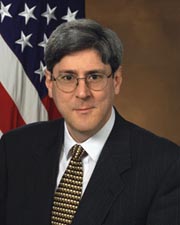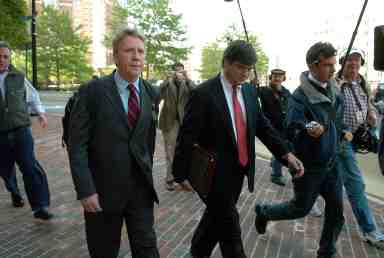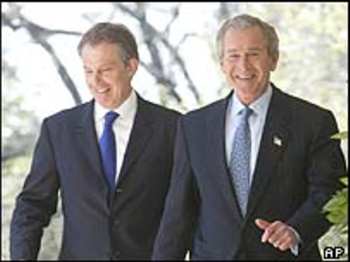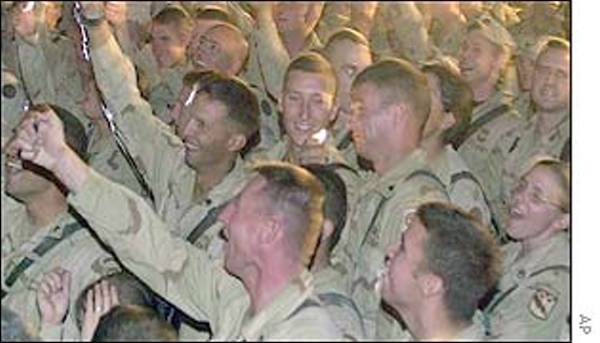
THE HANDSTAND
MAY 2005
.http://antiwar.com/

Israel's Fifth Column Exposed
Yesterday, Pentagon analyst and Iran specialist Larry A. Franklin was arrested by the FBI. The charge: turning over classified U.S. government documents to two operatives of the American Israeli Political Affairs Committee (AIPAC), longtime policy director Steve Rosen and his deputy Keith Weissman.
As Michael Isikoff and Mark Hosenball pointed out when the Franklin affair first came to light: "Franklin's motive appears to have been ideological rather than financial."
What ideology are they talking about? Unconditional support to Israel has always been a central tenet of neoconservative doctrine. As we have argued in these pages for years, American foreign policy has been shaped and distorted by a cabal of ideologues who put Israel, not America, first. Franklin's arrest confirms our thesis in spades.

It's no accident that Franklin was part of the Pentagon policy shop presided over by DoD undersecretary Douglas Feith, who also presided over the infamous "Office of Special Plans" which was set up to funnel misinformation about Iraq's nonexistent "weapons of mass destruction" and lie us into war. Israel's fifth column in Washington is about to be exposed big time.
| As Undersecretary of Defense for Policy, Mr.
Feith advises the Secretary and Deputy Secretary
of Defense on matters related to the formation of
national security and defense policy, as well as
Department of Defense policy regarding national
security objectives. Mr. Feith was nominated by President George W. Bush on April 30, 2001, and confirmed by the U.S. Senate on July 12, 2001. Prior to his appointment, Mr. Feith worked in the Washington, D.C. law firm of Feith & Zell, P.C., specializing in international law. |
Franklin's is going to be one exciting trial.
We've been following this story since before it became
headline news, providing you with up-to-the-minute
coverage and analysis of the story even after it fell
beneath the media's radar screen. There are plenty of
people who, for this very reason, would love to see us
shut down. They would cheer if our readers failed to come
through with the support we need to keep going.
We don't have the financial support the War Party
has nor do we have foreign countries backing up our
efforts. We just have you and now we're turning to
you for support. We've earned your support by following
stories like this, and now it's time for you to come
through for us. Contribute today so that we can
cover the trial of Larry Franklin tomorrow.
Proof the Fix Was In
Larry Franklin (left), who worked in the Pentagon until recently leaving a Washington DC court yesterday. The US government is prosecuting Franklin for spying on the US for Israel. He worked with Feith and Wolfowitz and provided the Israeli Embassy in Washington with secret US government information. He also provided the Israeli lobbying group, AIPAC, with secret defense and policy information (Assafir, 5/5/05).
by Ray McGovern
May 5, 2005
"Intelligence and facts are
being fixed around the policy."
Never in our wildest dreams did we think we would see
those words in black and white and beneath a SECRET
stamp, no less. For three years now, we in Veteran
Intelligence Professionals for Sanity (VIPS) have been
saying that the CIA and its British counterpart, MI-6, were ordered by their countries' leaders
to "fix facts" to "justify" an
unprovoked war on Iraq. More often than
not, we have been greeted with stares of incredulity.
It has been a hard learning that folks tend to
believe what they want to believe. As long as our
evidence, however abundant and persuasive, remained
circumstantial, it could not compel belief. It simply is
much easier on the psyche to assent to the White House
spin machine blaming the Iraq fiasco on bad intelligence
than to entertain the notion that we were sold a bill of
goods.
Well, you can forget circumstantial. Thanks to an
unauthorized disclosure by a courageous whistleblower,
the evidence now leaps from official documents this
time authentic, not forged. Whether prompted by the open
appeal of the international Truth-Telling Coalition or
not, some brave soul has made the most explosive
"patriotic leak" of the war by giving London's
Sunday Times the official minutes of a briefing by
Richard Dearlove, then head of Britain's CIA equivalent,
MI-6. Fresh back in London  from
consultations in Washington, Dearlove briefed Prime
Minister Blair and his top national security officials on
July 23, 2002, on the Bush administration's plans to make
war on Iraq.
from
consultations in Washington, Dearlove briefed Prime
Minister Blair and his top national security officials on
July 23, 2002, on the Bush administration's plans to make
war on Iraq.
Blair does not dispute the authenticity of the document,
which immortalizes a discussion that is chillingly
amoral. Apparently no one felt free to ask the obvious
questions. Or, worse still, the obvious questions did not
occur.
Juggernaut Before the Horse
In emotionless English, Dearlove tells Blair and the
others that President Bush has decided to remove Saddam
Hussein by launching a war that is to be "justified
by the conjunction of terrorism and weapons of mass
destruction." Period. What about the intelligence?
Dearlove adds matter-of-factly, "The intelligence
and facts are being fixed around the policy."
At this point, Foreign Secretary Jack Straw confirms that
Bush has decided on war, but notes that stitching
together a justification would be a challenge, since
"the case was thin." Straw noted that Saddam
was not threatening his neighbors and his WMD capability
was less than that of Libya, North Korea, or Iran.
In the following months, "the case" would be
buttressed by a well-honed U.S.-UK
intelligence-turned-propaganda-machine.
The argument would be made "solid" enough to
win endorsement from Congress and Parliament by conjuring
up:
* Aluminum artillery tubes misdiagnosed as nuclear
related;
* Forgeries alleging Iraqi attempts to obtain uranium in
Africa;
* Tall tales from a drunken defector about mobile
biological weapons laboratories;
* Bogus warnings that Iraqi forces could fire WMD-tipped
missiles within 45 minutes
of an order to do so;
* Dodgy dossiers fabricated in London; and
* A U.S. National Intelligence Estimate thrown in for
good measure.
All this, as Dearlove notes dryly, despite the fact that
"there was little discussion in Washington of the
aftermath after military action." Another nugget
from Dearlove's briefing is his bloodless comment that
one of the U.S. military options under discussion
involved "a continuous air campaign, initiated by an
Iraqi casus belli" the clear implication being
that planners of the air campaign would also see to it
that an appropriate casus belli was orchestrated.
The discussion at 10 Downing St. on July 23, 2002 calls
to mind the first meeting of George W. Bush's National
Security Council (NSC) on Jan. 30, 2001, at which the
president made it clear that toppling Saddam Hussein sat
atop his to-do list, according to then-Treasury Secretary
Paul O'Neill, who was there. O'Neill was taken aback that
there was no discussion of why it was necessary to
"take out" Saddam. Rather, after CIA Director
George Tenet showed a grainy photo of a building in Iraq
that he said might be involved in producing chemical or
biological agents, the discussion proceeded immediately
to which Iraqi targets might be best to bomb. Again,
neither O'Neill nor the other participants asked the
obvious questions. Another NSC meeting two days later
included planning for dividing up Iraq's oil wealth.
Obedience School

As for the briefing of Blair, the minutes provide further
grist for those who describe the UK prime minister as
Bush's "poodle." The tone of the conversation
bespeaks a foregone conclusion that Blair will wag his
tail cheerfully and obey the learned commands. At one
point, he ventures the thought that, "If the
political context were right, people would support regime
change." This, after Attorney General Peter
Goldsmith has already warned that the desire for regime
change "was not a legal base for military
action" a point Goldsmith made again just 12
days before the attack on Iraq until he was persuaded by
a phalanx of Bush administration lawyers to change his
mind 10 days later.
The meeting concludes with a directive to "work on
the assumption that the UK would take part in any
military action."
I cannot quite fathom why I find the account of this
meeting so jarring. Surely it is what one might expect,
given all else we know. Yet seeing it in bloodless black
and white somehow gives it more impact. And the
implications are no less jarring.
One of Dearlove's primary interlocutors in Washington was
his American counterpart, CIA director George Tenet. (And
there is no closer relationship between two intelligence
services than the privileged one between the CIA and
MI-6.) Tenet, of course, knew at least as much as
Dearlove, but nonetheless played the role of accomplice
in serving up to Bush the kind of "slam-dunk
intelligence" that he knew would be welcome. If
there is one unpardonable sin in intelligence work, it is
that kind of politicization. But Tenet decided to be a
"team player" and set the tone.
Politicization: Big Time
Actually, politicization is far too mild a word for what
happened. The intelligence was not simply mistaken; it
was manufactured, with the president of the United States
awarding foreman George Tenet the Medal of Freedom for
his role in helping supervise the deceit. The British
documents make clear that this was not a mere case of
"leaning forward" in analyzing the
intelligence, but rather mass deception an order of
magnitude more serious. No other conclusion is now
possible.
Small wonder, then, to learn from CIA insiders such as
former case officer Lindsay Moran that Tenet's malleable
managers told their minions, "Let's face it. The
president wants us to go to war, and our job is to give
him a reason to do it."
Small wonder that, when the only U.S. analyst who met
with the alcoholic Iraqi defector appropriately
code-named"Curveball" raised strong doubts
about Curveball's reliability before then-Secretary of
State Colin Powell used the fabrication about
"mobile biological weapons trailers" before the
United Nations, the analyst got this e-mail reply from
his CIA supervisor:
"Let's keep in mind the fact that this war's going
to happen regardless of what Curveball said or didn't
say, and the powers that be probably aren't terribly
interested in whether Curveball knows what he's talking
about."
When Tenet's successor, Porter Goss, took over as
director late last year, he immediately wrote a memo to
all employees explaining the "rules of the
road" first and foremost, "We support the
administration and its policies." So much for
objective intelligence insulated from policy pressure.
Tenet and Goss, creatures of the intensely politicized
environment of Congress, brought with them a radically
new ethos one much more akin to that of Blair's
courtiers than to that of earlier CIA directors who had
the courage to speak truth to power.
Seldom does one have documentary evidence that
intelligence chiefs chose to cooperate in both
fabricating and "sexing up" (as the British
press puts it) intelligence to justify a prior decision
for war. There is no word to describe the reaction of
honest intelligence professionals to the corruption of
our profession on a matter of such consequence.
"Outrage" does not come close.
Hope in Unauthorized Disclosures
Those of us who care about unprovoked wars owe the
patriot who gave this latest British government document
to the Sunday Times a debt of gratitude. Unauthorized
disclosures are gathering steam. They need to increase
quickly on this side of the Atlantic as well the
more so, inasmuch as Congress controlled by the
president's party cannot be counted on to discharge
its constitutional prerogative for oversight.

In its formal appeal of Sept. 9, 2004 to current U.S.
government officials, the Truth-Telling Coalition said
this:
"We know how misplaced loyalty to bosses, agencies,
and careers can obscure the higher allegiance all
government officials owe the Constitution, the sovereign
public, and the young men and women put in harm's way. We
urge you to act on those higher loyalties. …
Truth-telling is a patriotic and effective way to serve
the nation. The time for speaking out is now."
If persons with access to wrongly concealed facts and
analyses bring them to light, the chances become less
that a president could launch another unprovoked
war against, say, Iran.
http://www.antiwar.com/mcgovern/?articleid=5844
UPDATE, NOW WE FIND AHMAD CHALABI IN THE NEW IRAQ GOVERNMENT:
Franklin moved over to the Pentagon
from DIA, where he became the Iran expert, working
for Bill Luti and Undersecretary of Defense for Planning,
Douglas Feith. He was the "go to" person on
Iran for Deputy Secretary of Defense Paul Wolfowitz, and
for Feith. This situation is pretty tragic, since
Franklin is not a real Iranist. His main brief appears to
have been to find ways to push a policy of overthrowing
its government (apparently once Iraq had been taken care
of). This project has been pushed by the shadowy eminence
grise, Michael Ledeen, for many years, and Franklin
coordinated with Ledeen in some way. Franklin was also
close to Harold Rhode, a long-time Middle East specialist
in the Defense Department who has cultivated far right
pro-Likud cronies for many years, more or less
establishing a cell within the Department of Defense.
UPI cia Dawn reports: ' An UPI report said
another under-investigation official Mr Rhode
"practically lived out of (Ahmad) Chalabi's
office". Intelligence sources said that CIA
operatives observed Mr Rhode as being constantly on
his cell phone to Israel, discussing US plans, military
deployments, political projects and a discussion of Iraq
assets. '
| "Called in to help organize the Iraq
war-planning team was a longtime Pentagon
official, Harold Rhode, a
specialist on Islam who speaks Hebrew, Arabic,
Turkish, and Farsi. Though Douglas Feith would
not be officially confirmed until July 2001,
career military and civilian officials in NESA
began to watch his office with concern after
Rhode set up shop in Feith's office in early
January. Rhode, seen by many veteran staffers as
an ideological gadfly, was officially assigned to
the Pentagon's Office of Net Assessment, an
in-house Pentagon think tank headed by fellow
neocon Andrew Marshall. Rhode helped Feith lay
down the law about the department's new
anti-Iraq, and broadly anti-Arab, orientation. In
one telling incident, Rhode accosted and
harangued a visiting senior Arab diplomat,
telling him that there would be no 'bartering in
the bazaar anymore.... You're going to have to
sit up and pay attention when we say so.' "Rhode refused to be interviewed for this story, saying cryptically, 'Those who speak, pay.' "According to insiders, Rhode worked with Feith to purge career Defense officials who weren't sufficiently enthusiastic about the muscular anti-Iraq crusade that Paul D. Wolfowitz and Feith wanted. Rhode appeared to be 'pulling people out of nooks and crannies of the Defense Intelligence Agency and other places to replace us with,' says a former analyst. 'They wanted nothing to do with the professional staff. And they wanted us the fuck out of there.' "The unofficial, off-site recruitment
office for Feith and Rhode was the American
Enterprise Institute (A.E.I.), a right-wing think
tank whose 12th-floor conference room in
Washington is named for the dean of
neo-conservative defense strategists, the late
Albert Wohlstetter, an influential Rand
Corporation analyst and University of Chicago
mathematician. Headquartered at AEI is Richard
Perle, Wohlstetter's prize protege, the godfather
of the AEI-Defense Department nexus of
neoconservatives who was chairman of the
Pentagon's influential Defence Policy Board.
Rhode, along with Michael Rubin, a former AEI
staffer who is also now at the Pentagon, was a
ubiquitous presence at AEI conferences on Iraq
over the past two years, and the two Pentagon
officials seemed almost to be serving as stage
managers for the AEI events, often sitting in the
front row and speaking in stage whispers to
panelists and AEI officials." Centre for
Media and Democracy |
Bush and Blair Created
Reasons to Go to War
By US Congressman John Conyers
The London Times reports that the British government and the United States government had secretly agreed to attack Iraq in 2002, before authorization was sought for such an attack in Congress, and had discussed creating pretextual justifications for doing so.
The Times reports, based on a newly discovered document, that in 2002 British Prime Minister Tony Blair chaired a meeting in which he expressed his support for "regime change" through the use of force in Iraq and was warned by the nation's top lawyer that such an action would be illegal. Blair also discussed the need for America to "create" conditions to justify the war. .......This is the British government proclaiming foreknowledge of the manipulation of intelligence many of us have alleged for some time.
This should not be allowed to fall down the memory hole during wall-to-wall coverage of the Michael Jackson trial and a runaway bride. To prevent that from occurring, I am circulating the following letter among my House colleagues and asking them to sign on to it:
May ___, 2005
The Honorable George W. Bush President of the United States of America The White House 1600 Pennsylvania Avenue, N.W. Washington, D.C. 20500
Dear Mr. President:
We write because of troubling revelations in the Sunday London Times apparently confirming that the United States and Great Britain had secretly agreed to attack Iraq in the summer of 2002, well before the invasion and before you even sought Congressional authority to engage in military action. While various individuals have asserted this to be the case before, including Paul O'Neill, former U.S. Treasury Secretary, and Richard Clarke, a former National Security Council official, they have been previously dismissed by your Administration. However, when this story was divulged last weekend, Prime Minister Blair's representative claimed the document contained "nothing new." If the disclosure is accurate, it raises troubling new questions regarding the legal justifications for the war as well as the integrity of your own Administration.
The Sunday Times obtained a leaked document with the minutes of a secret meeting from highly placed sources inside the British Government. Among other things, the document revealed:
* Prime Minister Tony Blair chaired a July 2002 meeting, at which he discussed military options, having already committed himself to supporting President Bush's plans for invading Iraq.
* British Foreign Secretary Jack Straw acknowledged that the case for war was "thin" as "Saddam was not threatening his neighbours and his WMD capability was less than that of Libya, North Korea, or Iran."
* A separate secret briefing for the meeting said that Britain and America had to "create" conditions to justify a war.
* A British official "reported on his recent talks in Washington. There was a perceptible shift in attitude. Military action was now seen as inevitable. Bush wanted to remove Saddam, through military action, justified by the conjunction of terrorism and WMD. But the intelligence and facts were being fixed around the policy."
As a result of this recent disclosure, we would like to know the following:
1) Do you or anyone in your Administration dispute the accuracy of the leaked document?
2) Were arrangements being made, including the recruitment of allies, before you sought Congressional authorization go to war? Did you or anyone in your Administration obtain Britain's commitment to invade prior to this time?
3) Was there an effort to create an ultimatum about weapons inspectors in order to help with the justification for the war as the minutes indicate?
4) At what point in time did you and Prime Minister Blair first agree it was necessary to invade Iraq?
5) Was there a coordinated effort with the U.S. intelligence community and/or British officials to "fix" the intelligence and facts around the policy as the leaked document states?
We have of course known for some time that subsequent to the invasion there have been a variety of varying reasons proffered to justify the invasion, particularly since the time it became evident that weapons of mass destruction would not be found. This leaked document - essentially acknowledged by the Blair government - is the first confirmation that the rationales were shifting well before the invasion as well.
Given the importance of this matter, we would ask that you respond to this inquiry as promptly as possible. Thank you.
Sincerely,
Congressman John Conyers, Jr
669 Federal Building 231 W. Lafayette Detroit, MI 48226 (313) 961-5670 (313) 226-2085 Fax